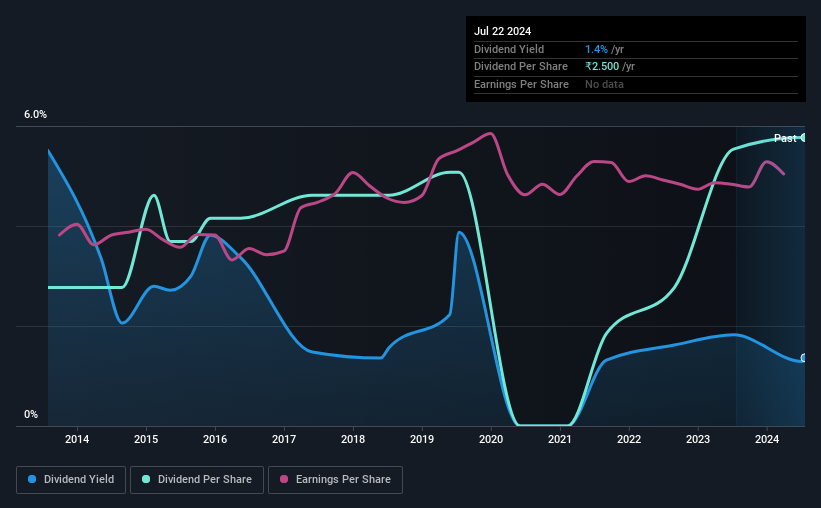- India
- /
- Diversified Financial
- /
- NSEI:TFCILTD
Tourism Finance Corporation of India (NSE:TFCILTD) Is Increasing Its Dividend To ₹2.50

Tourism Finance Corporation of India Limited (NSE:TFCILTD) will increase its dividend from last year's comparable payment on the 13th of September to ₹2.50. This makes the dividend yield about the same as the industry average at 1.4%.
See our latest analysis for Tourism Finance Corporation of India
Tourism Finance Corporation of India's Dividend Is Well Covered By Earnings
We aren't too impressed by dividend yields unless they can be sustained over time. Tourism Finance Corporation of India is quite easily earning enough to cover the dividend, however it is being let down by weak cash flows. With the company not bringing in any cash, paying out to shareholders is bound to become difficult at some point.
Looking forward, EPS could fall by 1.6% if the company can't turn things around from the last few years. If the dividend continues along recent trends, we estimate the payout ratio could be 27%, which we consider to be quite comfortable, with most of the company's earnings left over to grow the business in the future.

Dividend Volatility
While the company has been paying a dividend for a long time, it has cut the dividend at least once in the last 10 years. The annual payment during the last 10 years was ₹1.20 in 2014, and the most recent fiscal year payment was ₹2.50. This works out to be a compound annual growth rate (CAGR) of approximately 7.6% a year over that time. It's good to see the dividend growing at a decent rate, but the dividend has been cut at least once in the past. Tourism Finance Corporation of India might have put its house in order since then, but we remain cautious.
Dividend Growth May Be Hard To Achieve
With a relatively unstable dividend, it's even more important to evaluate if earnings per share is growing, which could point to a growing dividend in the future. Unfortunately, Tourism Finance Corporation of India's earnings per share has been essentially flat over the past five years, which means the dividend may not be increased each year.
Tourism Finance Corporation of India's Dividend Doesn't Look Sustainable
In summary, while it's always good to see the dividend being raised, we don't think Tourism Finance Corporation of India's payments are rock solid. While the low payout ratio is a redeeming feature, this is offset by the minimal cash to cover the payments. We don't think Tourism Finance Corporation of India is a great stock to add to your portfolio if income is your focus.
Companies possessing a stable dividend policy will likely enjoy greater investor interest than those suffering from a more inconsistent approach. Still, investors need to consider a host of other factors, apart from dividend payments, when analysing a company. Case in point: We've spotted 3 warning signs for Tourism Finance Corporation of India (of which 1 shouldn't be ignored!) you should know about. Is Tourism Finance Corporation of India not quite the opportunity you were looking for? Why not check out our selection of top dividend stocks.
If you're looking to trade Tourism Finance Corporation of India, open an account with the lowest-cost platform trusted by professionals, Interactive Brokers.
With clients in over 200 countries and territories, and access to 160 markets, IBKR lets you trade stocks, options, futures, forex, bonds and funds from a single integrated account.
Enjoy no hidden fees, no account minimums, and FX conversion rates as low as 0.03%, far better than what most brokers offer.
Sponsored ContentValuation is complex, but we're here to simplify it.
Discover if Tourism Finance Corporation of India might be undervalued or overvalued with our detailed analysis, featuring fair value estimates, potential risks, dividends, insider trades, and its financial condition.
Access Free AnalysisHave feedback on this article? Concerned about the content? Get in touch with us directly. Alternatively, email editorial-team (at) simplywallst.com.
This article by Simply Wall St is general in nature. We provide commentary based on historical data and analyst forecasts only using an unbiased methodology and our articles are not intended to be financial advice. It does not constitute a recommendation to buy or sell any stock, and does not take account of your objectives, or your financial situation. We aim to bring you long-term focused analysis driven by fundamental data. Note that our analysis may not factor in the latest price-sensitive company announcements or qualitative material. Simply Wall St has no position in any stocks mentioned.
Have feedback on this article? Concerned about the content? Get in touch with us directly. Alternatively, email editorial-team@simplywallst.com
About NSEI:TFCILTD
Tourism Finance Corporation of India
A financing institution, provides financial assistance services in India.
Average dividend payer with mediocre balance sheet.
Similar Companies
Market Insights
Community Narratives



